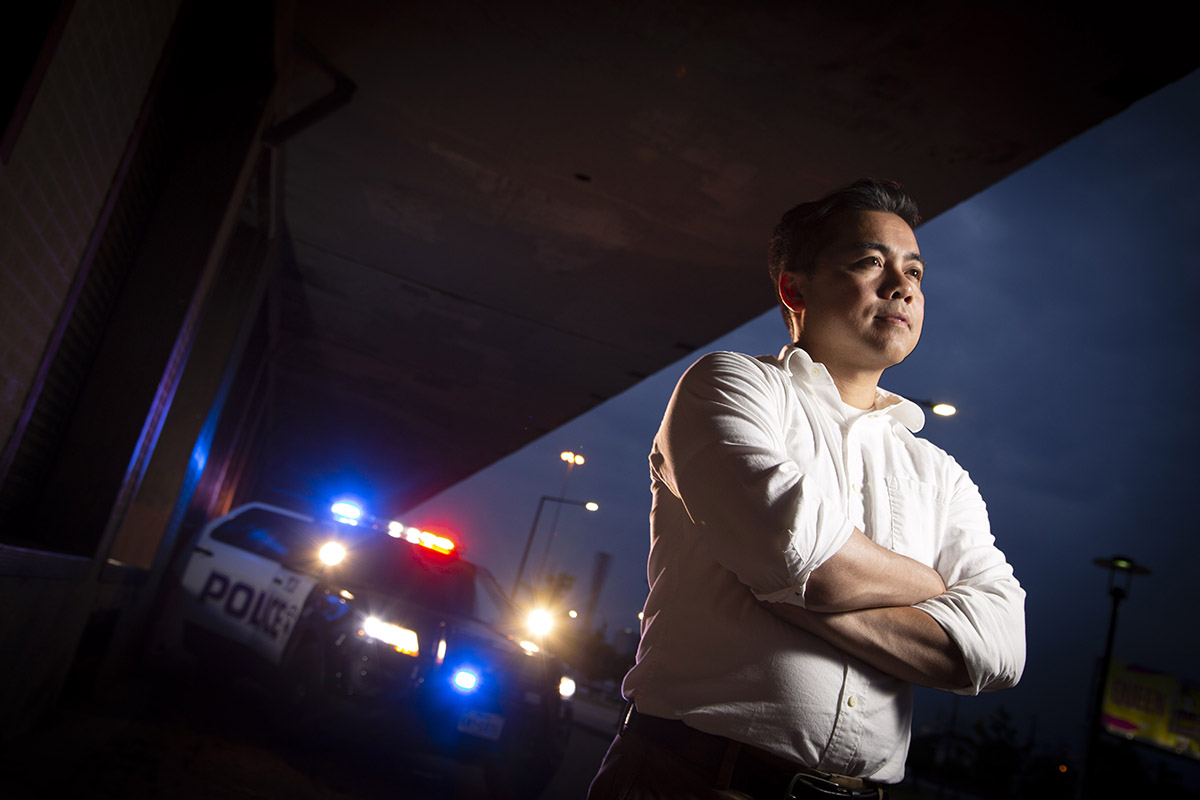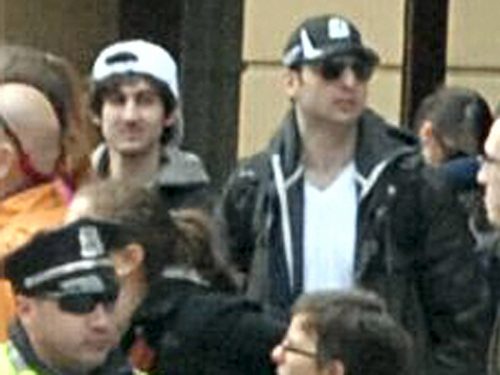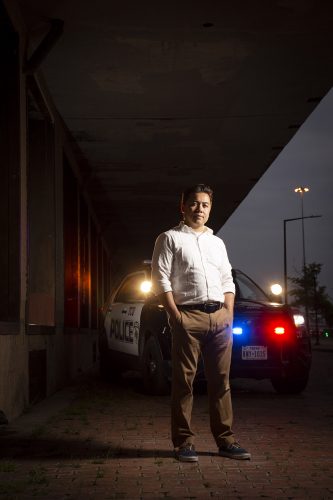Crowdsourcing Can Lead to Solving Crimes with Police
Johnny Nhan analyzed how citizens banded together on platforms like Reddit to find the Boston Marathon bombers.

Johnny Nhan, assistant professor and graduate director of criminal justice, says citizens are banding together online to help police solve crimes like the Boston Marathon bombing and the recent kidnapping of a Fort Worth girl. Photo by Joyce Marshall
Crowdsourcing Can Lead to Solving Crimes with Police
Johnny Nhan analyzed how citizens banded together on platforms like Reddit to find the Boston Marathon bombers.
In April 2013, the country watched in horror as the Boston Marathon bombings left three people dead and more than 250 injured. Harrowing images of fleeing crowds and smoke-filled Boston streets filtered into homes across America. Meanwhile, online sleuths were churning through information, sharing collective knowledge and forging a new investigative force.
Johnny Nhan, associate professor and graduate director of criminal justice, teamed up with researchers Laura Huey of Western University in London, Ontario, and Ryan Broll of the University of Guelph in Guelph, Ontario. Huey and Broll study “citizen-police relationships in terms of fighting crime and fighting crime online,” Nhan said. The three professors were interested in online public forums, mainly Reddit, and the concurrent investigations done on these websites by members of the public who want to help police solve a crime.
“Crowdsourcing is the idea of using the collective knowledge, collective resources of everybody.”
Johnny Nhan
In the bombings’ aftermath, cybersleuths sifted through street camera footage, police reports and personal photographs in real time as police conducted a sophisticated investigation — including video surveillance, infrared helicopter cameras and advanced forensic procedures such as explosive and blood pattern analyses — coordinated at the local, state and federal levels.
Nhan and his colleagues coded and analyzed the online investigations by looking at the top comments, voted on by Reddit users and automatically displayed by the site, in each thread and sorting them into themes. The team studied the theme “investigation-related information.”
What emerged from Nhan’s research into the bombings was that crowdsourcing has the potential to be a valuable tool for police. “Crowdsourcing is the idea of using the collective knowledge, collective resources of everybody,” Nhan said.

The two Boston Marathon bombers walk near the marathon finish line on April 15, 2013. The twin bombings at the 116-year-old Boston race resulted in the deaths of three people with more than 170 others injured. Photo provided by FBI via Getty Images
For example, a Reddit user with a military background saw pictures of the Boston explosive devices on the forum, then explained on the site how the bombs can be made by hand. Other collective resources ranged from knowing the type of rubber used in a triggering mechanism to details about one suspect’s hat.
Solving the crime, however, was not the Reddit community’s only mission.
Some engaged in “digitalantism,” which Nhan described as “using the online community to perform some kind of street justice or act of justice.” He attributed this online vigilantism to “a frustration because the police aren’t working fast enough.”
Police, Nhan said, prefer passive help, when the public contributes knowledge and findings while giving law enforcement the space to do the physical work.
“If police endorse crowdsourcing … that sort of opens the floodgates,” he said. “The danger is the legal liability of finding the wrong person.”
During the bombings and the subsequent online investigation, Reddit users incorrectly marked 22-year-old college student Sunil Tripathi as the second bomber. This lead made the rounds on Twitter and even some news outlets before being disproved. Such a mistake sours the police attitude toward crowdsourcing, Nhan said.
Longstanding wariness of the police also exists among some groups of the public, especially minorities, Nhan said. He said his research reinforced a “deep-seated cultural mistrust between the police and the public … the old cliché of us versus them.”
Additionally, some online watchdog sites foster an antagonistic view of police by posting videos of officers mishandling situations.
This uneasiness, exacerbated by social media and other factors, will continue to stand in the way of police using the potentially massive resource of crowdsourcing, Nhan said.

Johnny Nahn’s recent research focuses on crowdsourcing: the phenomenon of citizens using the collective intelligence of social media and other internet tools to investigate crimes, as seen in the aftermath of the 2013 Boston Marathon bombing. Photo by Joyce Marshall
It will take building a strong community relationship to reap the benefits of crowdsourcing, he said, adding that community policing is a goal of “pretty much every department these days.”
Neil Noakes ’19 MS, deputy chief over the Fort Worth Police Department’s North Command, partnered with Nhan in research involving city police and the TCU Criminal Justice Department. He agrees that bridging the gap between the public and law enforcement involves community policing.
“Fort Worth has always been about community policing,” he said. “The police need the help of people. … We can’t do it ourselves.”
Noakes, whose work with Nhan sought to integrate community policing into officer field training, voiced similar hopes and concerns with crowdsourcing investigations.
“It has created a form of digital relationships through which information can be freely shared between members of law enforcement and members of the community,” he said, noting the role that social media played in the rescue of a girl kidnapped as she walked with her mother on a Fort Worth street in May. Descriptions of the suspect and his car, the girl’s photo, and video that caught part of the incident went viral on social media. Two volunteer searchers spotted the vehicle, leading to an arrest and the return of the girl.
But social media also holds the “potential for false narratives to get out [and] for completely innocent people to be drawn in,” Noakes said, mentioning Tripathi in the Boston bombings.
However, Nhan is optimistic because he sees crowdsourcing and social media as ultimately beneficial for police and their relationships with communities. “It really furthers the legitimacy of police,” he said.
After cases like the Boston bombings and Fort Worth kidnapping, police are realizing that the public’s help goes beyond being extra sets of eyes and ears, Nhan said. By building online relationships, he said, police are tapping into the resourcefulness of citizens and the expertise of engineers, product experts and others in the shared goal of solving crimes.

Your comments are welcome
Comments
Related reading:
Research + Discovery
‘Rabble’ Rouses Interest in 1960s Language
English professor combs archives across the country to document 1960s social movements.
Campus News: Alma Matters, Research + Discovery
Faculty from Other Disciplines Use Liberal Arts
How do you merge the liberal arts with your curriculum?
Features
Jim Wright Journals Offer Inside View of Political Life
In diaries left to TCU, the congressman talks politics and power.